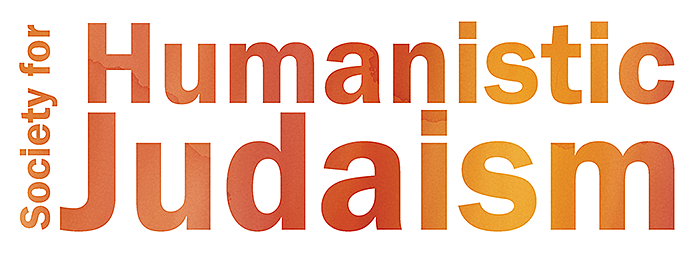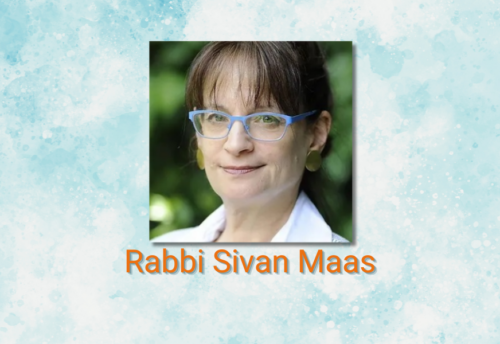
This article was published in the Spring 2022 Issue of Humanistic Judaism Magazine. It was written by Sam Grabelle, a new member of SHJ and Kahal B’raira in Cambridge, MA. She has been an educator and social worker and wrote the national award-winning book The Big Picture: Education is Everyone’s Business. Sam lives in Warwick, RI with her 10-year-old son Julius.
I know what you’d like to know first. Both of my parents are Jewish, each with an Eastern European immigrant parent.
Mom grew up poor in Brooklyn and dropped out of high school. Dad’s dad did well in Newark and sent him to medical school in Switzerland. Dad supported Mom in her slow but steady pursuit of further education and was beyond proud when she became a successful attorney.
You also want to know that I got my BA with Honors from Brown University and have a master’s degree. My mom told me not to apply for scholarships and we didn’t need financial aid. All three of my siblings also went to college and one to law school. We had a large sailboat and orthodontia, saw some Broadway plays, and had Chinese food on Christmas. Except for designer jeans and my own color TV, I wanted for nothing.
People have always told me I don’t look Jewish. I also know that in the same non- sensical way, you would also think I don’t look poor. But I am and have been for nearly a decade. The reasons are not unusual but unique to me as is my experience of poverty. I am not here to speak for all poor people and certainly not all poor Jews. But I do think what I have to say about the ways I’ve experienced being poor within Jewish communities, organizations, and congregations point to ways these entities and the individuals within them could rethink the way they welcome, interact with, and serve poor Jews; or, if you prefer, Jews who happen to be poor.
If you google “poor Jews” or “Jewish poverty” you will find two recent articles titled “Why We Don’t Talk About Jewish Poverty – And Why We Should” and “22 Rabbis Agree: It’s Time to Stop Ignoring Jewish Poverty.” There’s even one with a title I almost unintentionally plagiarized for this piece – “I’m a Poor  Jew. Yes, We Exist.” One of the 22 rabbis says, “Many believe the myth that there is no such thing as a poor Jew, but there is.” Another asserts, “Systematically, within our own communities, we can recognize, and teach, that it is just a myth that no one suffers financial hardship in Jewish communities.”
Jew. Yes, We Exist.” One of the 22 rabbis says, “Many believe the myth that there is no such thing as a poor Jew, but there is.” Another asserts, “Systematically, within our own communities, we can recognize, and teach, that it is just a myth that no one suffers financial hardship in Jewish communities.”
An essay in a 1974 book titled Poor Jews: An American Awakening shows this goes way back. The author states: “to many people the phrase ‘the Jewish poor’ is a contradiction in terms. Jews are simply not regarded as poor.” And in 2007, the CEO of a NY-based Council on Jewish Poverty used the exact same phrase – “Usually the words ‘Jewish poverty’ are seen as a contradiction in terms.” Chapter One of a fascinating and undoubtedly controversial 2011 master’s thesis from a Smith College student begins:
“The notion of American Jews living in poverty or low-income households has been studied so infrequently in recent years… and conjures up an image so contrary to the prevailing stereotype of Jewish wealth and power, that one might think poor or low- income Jewish households simply do not exist.”
I wouldn’t be surprised if you are not surprised that this belief in this myth or “contradiction in terms” is still widespread among Jews. Every Jewish person I have spoken to about this topic has at least been aware of it, if not willing to admit they believe it, too. Rabbi Miriam of the SHJ asked me to write this article because of her own awareness of its prevalence. And I felt compelled to write it, in part, because I wanted to free myself of the shame I feel because I believe it, too. Jewish people aren’t poor. Or at least they wouldn’t be if they lived by Jewish values, were raised Jewish – even secularly as I was – and worked hard. But I do and I was and I did. I worked really hard. At one point, when I was pregnant with my son, I had four jobs. In my job searching since then, I have been able to find a variety of part-time, temporary, short- term, per diem, and similar positions but nothing full-time.
For three years, I was an adjunct professor at a local university. If you aren’t familiar with “academia’s permanent underclass” just google “adjunct poverty” and you’ll soon become an expert. You’ll also find out that despite widespread awareness, no one is doing anything about it. Like 25% of adjuncts, I survived with food stamps (called SNAP since 2008), Medicaid, and support from my family. When the college offered me an additional course one trimester, my income locked me out of Medicaid and I immediately had to start paying for private insurance. The next trimester they reduced my course load to one and I was able to get back on public assistance. But in the meantime, I had a cancer scare (the same one that my mother survived but killed her mother) and the tradeoff of a high deductible for a lower premium meant I was stuck with the bills.
That is just one of the many challenges I’ve faced and that have caused me to be both Jewish and poor. But I’m scrappy and intelligent and resourceful and I do not give up. And I am not afraid to ask for help, especially for my son. And, most importantly, I have my mother and my sister who are always willing to fill in the gaps.
I also have a Master’s in Social Work, advanced technology skills, excess time on my hands, and a surprising amount of patience. All are invaluable as I tackle the relentless forms, spend hours online and on hold, navigate the maze of systems and resources, and calculate whether I can afford to work. Being poor is a full-time job. And, of course, I still have to keep looking for a job – searching, matching my qualifications, writing cover letters, tailoring my CV, robot- proofing my submissions, and following up. My inbox overflows with rejection letters. I interview well, but rarely get the opportunity.
Thanks to great references within the community and despite being overqualified, I once got an interview with a small, local Jewish organization. When I learned it was full-time without benefits, I spent hours figuring out the maximum salary I could earn before I would lose the ones I had. DHS has online calculators for this, but it is a very inexact science. At my first interview, I awkwardly raised the idea that if they paid me less, I would be able to keep my health insurance. I did get a second interview with the board, but what transpired is painful to recall. Aside from some very uncomfortable and, honestly, unlawful questions about my ability to provide care for my child if I worked full-time, they wanted to  know if I was “the right amount of Jewish” to be the type of person they were looking for, but “not so Jewish” that I wouldn’t be able to work on Shabbat and the High Holidays. They found it hard to believe I would be able to stay on Medicaid even at a lower salary and questioned my research methods. One board member asked if I understood that if I stayed employed there as long as they’d hoped, I would not be able to afford college for my son who was seven at the time.
know if I was “the right amount of Jewish” to be the type of person they were looking for, but “not so Jewish” that I wouldn’t be able to work on Shabbat and the High Holidays. They found it hard to believe I would be able to stay on Medicaid even at a lower salary and questioned my research methods. One board member asked if I understood that if I stayed employed there as long as they’d hoped, I would not be able to afford college for my son who was seven at the time.
I know this might be an extreme example, but I believe that what was beneath the disgraceful way I was treated was their inability to relate to a poor Jew… because they’d never encountered one, or at least knew they had. They didn’t realize how demeaning their behavior was and I’m sure believed that they were “good Jews” – all tzedakah and tikkun olam and gemilut chasadim. And I’m sure they are. As am I.
But good Jewish values are clearly not enough. If you don’t believe we exist, you will ensure that we feel invisible and unwelcome. If you know we exist but still think we are “a contradiction in terms,” you will not know how to include us or help us. And if you are helping us but don’t really understand the diversity of poverty, you will be helping a nameless faceless Jew instead of the one sitting next to you.
Just as I have not always been poor, I have not always been an active member of the Jewish community. In fact, I attended my first formal Jewish event as an adult just a few years ago, when my aunt’s death meant the end of Passover, which, as with many secular families, was our only Jewish tradition. My son and I attended a second night Seder that I couldn’t afford, but no financial assistance was advertised. At five- years-old, he fell in love with everything Jewish that night. In the five years since then, I have joined three different congregations – including a year as a K-3 Sunday school teacher – before finally finding a home at Kahal B’raira, the Humanistic Judaism congregation in Cambridge, MA. It’s a 3-hour round trip for us, but his first day of Sunday school and my first adult service convinced us both that it was worth it.
During this time, I have sought help from the Kesher social worker assigned to my first temple, Jewish Collaborative Services and its Kosher Food Bank, as well as one rabbi’s discretionary fund. But I have also contributed to Jewish community, by teaching Sunday school, facilitating a “parenting during the pandemic” workshop, joining the temple gardening committee, representing my congregation in a 3-part workshop on Relational Judaism, signing up to be a B Mitzvah mentor, and being an active participant in an Introduction to Judaism course.
I have never shied away from asking for full financial aid for membership and school and have been granted it from every congregation. But none of them had a formal, advertised process so it has always involved an awkward admission to being extremely low-income, followed by a long-winded, emailed explanation of our situation that always comes out sounding to me a lot like – “I know I’m Jewish and I’m not supposed to be poor, but I am and I can prove it.” I greatly appreciate the other ways I’ve been helped financially, but they, too, have involved uncomfortable interactions.
Based on these experiences, I’d like to suggest some changes in attitude, approach, and policy that would greatly improve the Jewish community’s ability to welcome and serve poor Jews.
Remember that there are poor Jews who are not affiliated with a congregation, school or community center. Find them and offer help anyway.
When presenting a tzedakah box or defining tzedakah as a central Jewish value, acknowledge those who are unable to give at this time. Also, consider whether the money collected could go directly or indirectly to them.
to them.
Recognize the contradiction in the teachings that Jews have an obligation to avoid poverty AND that the poor must be respected and protected.
Advertise and provide a simple and formal process for requesting financial aid for membership or religious school. The New York Times recently reported on rabbis who have promoted getting rid of the entrenched dues model altogether, condemning the “shame route” poor Jews must navigate and the need to stop equating the bonding of Jews as a financial arrangement.
When choosing social justice causes to champion, remember the poor Jews. Consult with us on the needs of our community, lobby for policy changes that will directly help us, fundraise to provide us with the support we actually need, and in your earnestness to fulfill the commandment to help others recognize that while we need help, we are not the other.
Raise your Jewish children to understand the diversity of the Jewish people including socioeconomics. Rather than the canned food drives, short-term volunteering, and used clothing and toy donations, encourage them to ask questions about what poor people really need and teach them how they can use their time and energy to raise awareness and support systemic change. Give a Jewish kid a box of cans and you feed a few people with processed food for a day; teach a Jewish child how to make a real difference and you create an activist for a lifetime.
Consider other ways to provide direct funds to poor people than gift cards to the stores where you shop. More than a shopping spree, poor people need car insurance, prescriptions, and heat, among many other things they don’t sell at Target. I shop almost exclusively at thrift stores and retailers who sell in bulk or offer valuable coupons and cash back promotions. If you don’t know where we shop, don’t assume; ask us.
Poor parents are often very good at figuring out how to put food on the table and presents next to the menorah or under the tree. Don’t assume our children want the gifts you would buy or will eat the food you eat (or the generic stuff you won’t). The SNAP program is a long-term solution whose benefits far outweigh twice monthly visits to a Food Bank. Rather than toys, consider gifting zoo or YMCA memberships, or asking the parents what they really wish they could give their children. I would love for my son to be able to take piano lessons and our soccer club only offers partial scholarships.
Consider that we cannot wait for your organization’s protracted process of determining need and providing support in order to pay a medical or car repair bill. Too often these processes can drain away critical time and resources from us when we can least afford it.
In addition to providing members opportunities to volunteer at a shelter or use their tech skills to update the organization’s computers, encourage them to use their professional qualifications to support fellow congregants in need. An accountant could offer pro bono tax services, a teacher could offer tutoring, an orthodontist could arrange for a free exam, a college professor could edit an application essay, a lawyer could provide pro bono legal services to help with a divorce or disability determination.
Finally, provide a list of local and government resources on your website and, if possible, help to access them. It is an arduous and often lonely task to apply for Medicaid, heating assistance, SNAP, and free/reduced school lunches. Plus there are a myriad of resources that too few know about. SNAP recipients can get free or reduced museum admissions through Museums4All, 50% off Amazon Prime, and free phone and broadband service through the federal Lifeline program. The MusicLink Foundation recruits music teachers to offer free or reduced lessons to low-income children. If we are serious about empowering poor people, providing a clearinghouse for these types of resources would be a great start.
If someone is embarrassed or unsure how to ask for help from a company, organization, or government entity, offer to do it for them.
Once I started talking about my experience with poverty, the response was so positive, I decided that I need to keep talking. Even if my circumstances someday change and I can pay my own rent and bills and send my kid to college, being poor will always affect me. My life expectancy is shorter, my mental health is worse, and my choices will always be limited by a lack of savings, gaps in my employment history, outdated credentials, disappearing references, a long-ago cashed out 401k, a meager Social Security fund, and all the rest of the barriers to economic stability and upward mobility.
Poor Jews exist. We are not the other. Our needs are not simple or obvious. Let us reveal ourselves in ways that preserve our dignity and enable us to be welcomed without judgment or red tape. Include us in your philanthropy and do it in ways that help us today and tomorrow. Fight for us at every level without the fear of admitting we exist. Remember that while our bank accounts may be empty, our lives may be very full. Do not feel sorry for us. Feel empathy. Humanistic Judaism relies on empathy “to address Jewish and universal human questions and to help improve the world and ourselves.” And last of all, consider adding us to your list of the diversities you celebrate. We may not be happy about being poor, but our poverty is part of our identity and deserves recognition.




Thank you for your important article, Sam. My parents felt shame for so long in our small town, being the Jews whose small family-owned grocery was passed on to them. So Dad didn’t have time to use the GI Bill for college when his old friends did.
They would not declare bankruptcy when the store needed to close, but instead paid off all creditors over many years with a second mortgage on our small home. They were angry when the shul called for them to pay their dues fully, with no effort to be flexible. But that was their Jewish community, so they were silent about it.
I certainly grew up with mixed feeling about my Judaism as a result. My current SHJ community handles money issues with kindness.
We all walk a tightrope. Thank you for your article, Sam. Thank you for your blog entry, Marlene. Cheers, Vinny
I..am 72 Jewish a widow disabled and poor. In new hampshire.